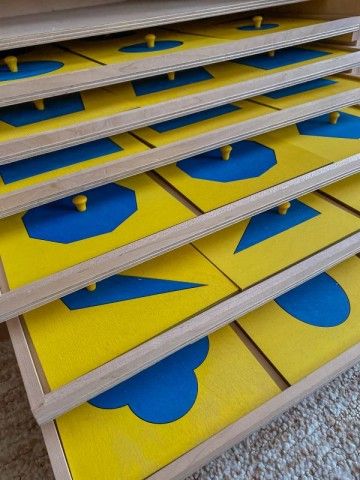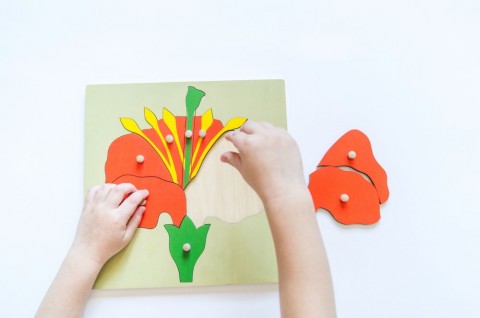The Adult Skills of the Montessori Child

Parents often wonder about the extraordinary lessons of Montessori that seem beyond the norm for young children. An example would be the uniqueness of the Botany Cabinet with its eighteen different leaf shapes and exotic names – obcordate, hastate, and reniform. Or the Geometric Cabinet with its 26 different shapes that children master and become conversant with the differences between obtuse angled isosceles triangles and acute angled scalene triangles as well as knowing quadrilaterals, trapezoids and heptagons
- These exercises develop the adult skills of comparing and contrasting, analyzing and discerning differences while learning the underlying significance of the differences.
- They learn to understand – not just memorize – what they study then they apply it to the world around them discovering the patterns and constructs that make up their world. It is very common for Montessori children to continue to discover all around them the shapes and contours of their world. A mother once took her three year old into the restroom. She came out shocked as the child had pointed out the quatrefoils in the air freshener.
- This attention to detail, this analysis continues for a life time. It leads to learning outside of the box, to continually discover the world around you and apply these early-learned skills to resolving the challenges of business, and science and math. It gets applied to art and music and relations and management. It touches and enriches every avenue of life.
- In the Montessori environment are also the Botany Puzzles and the Zoology Puzzles that bring a “visual dissection” of plants and animals where the child views the components of flowers and leaves and frogs and birds and develops not only an appreciation for detail but for wonder of the world around them.
- Then there are the globes and the maps with the study of continents and countries with the exploration and knowledge of a great big world. They learn the names of faraway places which in today’s world are no longer far away.
- The Montessori math experience is one of understanding – not memorization. It goes from the concrete to the abstract of addition and subtraction and multiplication and division. Math becomes, not only a learned skill, but an understood one. And with that comes the comfort and excitement of facing challenges.
- Montessori children are taught to work for mastery – making mistakes is part of the learning process and success comes at the end of trials and errors. Real life success goes to people who don’t quit until the job is done which is the norm of a Montessori experience.
- Montessori children develop a large vocabulary that accompanies their amazing breadth of experience and knowledge from within their classroom. It has been shown that one factor of adult success is a large and varied vocabulary.

The Montessori classroom provides a unique and solid base from which children launch themselves into life with the beginning skills of adulthood already in use and waiting to be applied to greater and greater challenges.
by Edward Fidellow